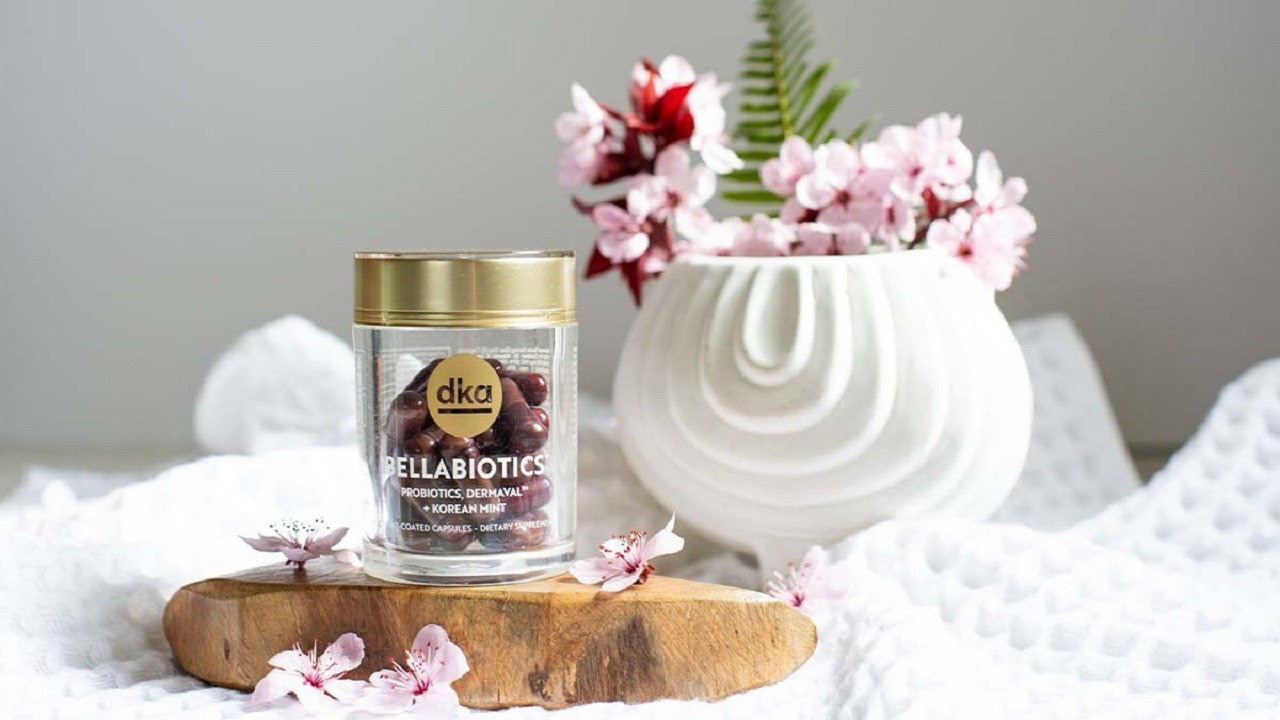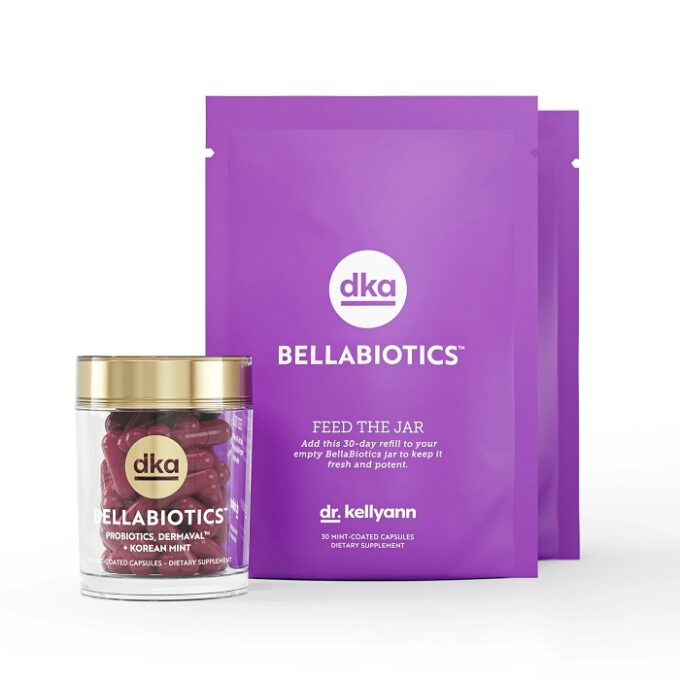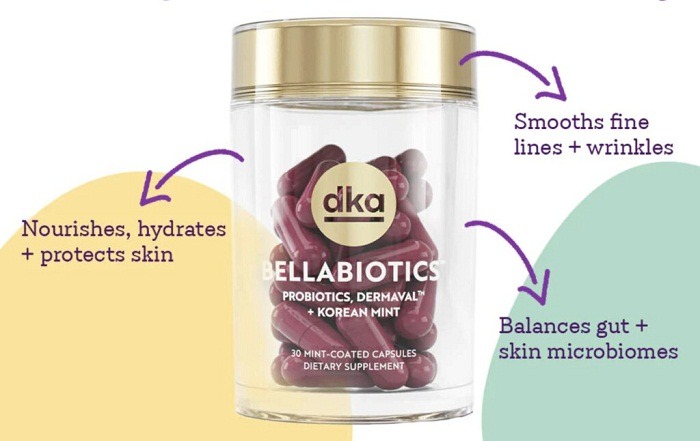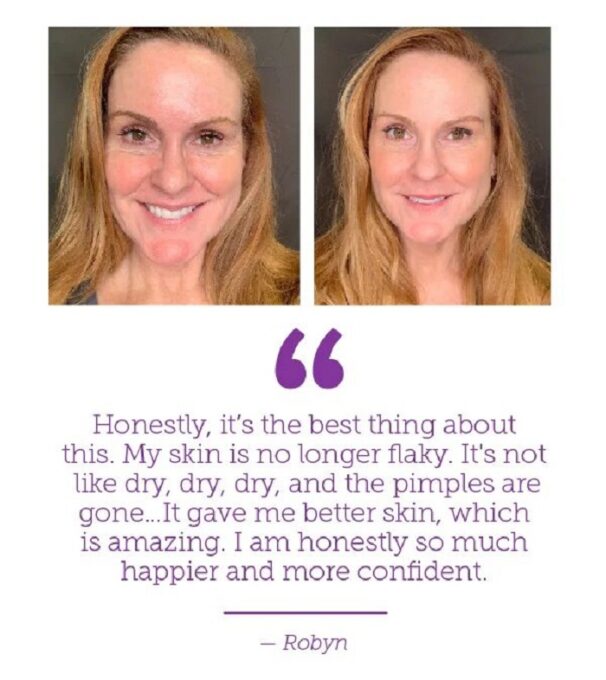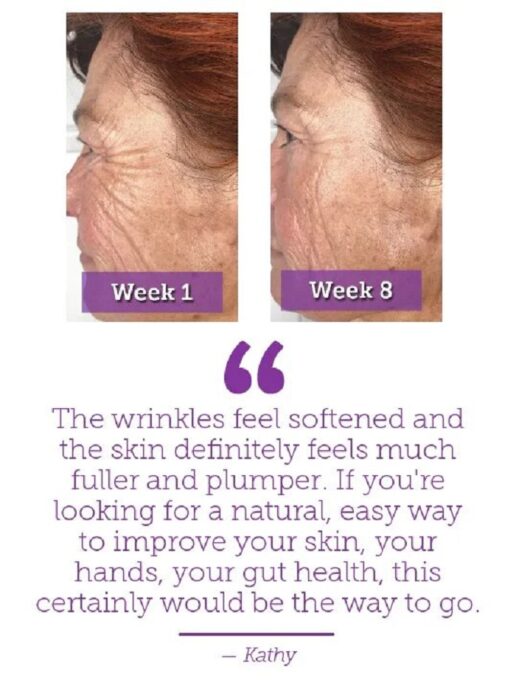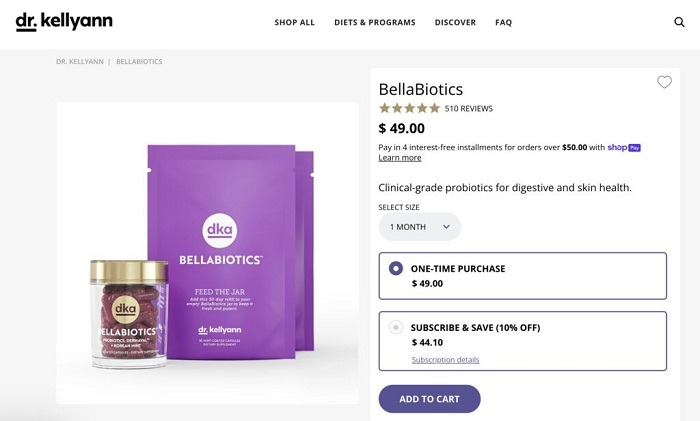BellaBiotics Review
Contents
In today’s era of holistic wellness, consumers are increasingly drawn to products that promote a “from the inside out” approach to health and beauty. BellaBiotics, a dietary supplement, capitalizes on this trend by combining probiotics, vitamins, and proprietary blends to target both digestive and skin health. This comprehensive review delves into the science behind BellaBiotics’ ingredients, analyzes its potential benefits and drawbacks, and explores alternative approaches for achieving optimal gut and skin health.
Related Post: Garden of Life Probiotics for Women & Prebiotics Review
Probiotics and the Gut-Skin Connection
The human gut microbiome is a complex ecosystem teeming with trillions of bacteria, both beneficial and harmful. Probiotics, live bacteria that offer health advantages, have garnered significant attention in recent years. Research suggests a fascinating link between gut health and skin health. A balanced gut microbiome may contribute to a stronger immune system, improved digestion, and potentially, healthier-looking skin [1]. This connection stems from the gut-brain axis, a bidirectional communication pathway between the gut microbiota and the central nervous system, which can influence various physiological processes, including skin health [2]. However, the specific mechanisms underlying this connection are still being unraveled.
BellaBiotics Ingredients
- Probiotic Strains: BellaBiotics contains two specific probiotic strains: Lactobacillus paracasei and Lactococcus lactis.
- Lactobacillus paracasei: This strain demonstrates promise in promoting gut health by reducing bloating, constipation, and inflammatory bowel disease symptoms [3]. Additionally, some studies suggest it may enhance the immune system and potentially reduce the risk of allergies [4]. However, research specifically investigating Lactobacillus paracasei’s direct impact on skin health is limited.
- Lactococcus lactis: This strain plays a role in lactose digestion and may offer mild benefits for gut health [5]. While some studies hint at its potential to enhance skin barrier function, further research is needed to confirm these effects [6].
- Dermaval®: This proprietary blend is shrouded in some mystery. The manufacturer claims it contains nine plant-based antioxidants that promote skin elasticity and collagen production. Antioxidants are well-established for their ability to combat free radical damage, which contributes to skin aging. However, the lack of transparency regarding the specific ingredients and their dosages within Dermaval® makes it difficult to independently assess its efficacy for these claims.
- Agatri Korean Mint: This ingredient boasts antioxidant and anti-wrinkle properties. While studies suggest Agatri Korean Mint may possess some antioxidant activity, robust clinical trials specifically evaluating its effectiveness for reducing wrinkles are lacking [7].
Scientific Evidence for BellaBiotics’ Claims
The marketing claims of BellaBiotics focus on promoting both gut and skin health. Let’s delve into the scientific evidence supporting these claims:
- Improved Digestion and Gut Health: The inclusion of Lactobacillus paracasei offers some scientific backing for this claim. Research suggests this strain can alleviate digestive issues like bloating and constipation [3]. However, the effectiveness of probiotics can vary depending on individual factors, and further research is needed to determine the optimal dosage and specific strains most beneficial for digestive health.
- Reduced Appearance of Wrinkles and Fine Lines: While the individual ingredients in BellaBiotics possess some antioxidant properties, there’s a dearth of high-quality clinical trials directly evaluating the product’s ability to reduce wrinkles or fine lines. For a more definitive answer on wrinkle reduction, topical skincare products containing ingredients like retinol and vitamin C have a stronger scientific foundation.
- Enhanced Skin Elasticity and Reduced Sagging: Dermaval® is the key ingredient purported to improve skin elasticity. However, the lack of transparency regarding its composition makes it impossible to assess its effectiveness for this claim. Consuming a balanced diet rich in collagen-promoting nutrients like vitamin C and certain amino acids may be a more well-supported approach for improving skin elasticity.
- Protection against UV Damage from Electronic Devices: The claim that BellaBiotics protects against UV damage from electronic devices lacks strong scientific backing. While some studies suggest blue light emitted from electronic devices might contribute to hyperpigmentation, the evidence for its significant impact on skin aging is inconclusive [8]. Sunscreen remains the gold standard for protecting against harmful UV rays.
- Boosted Collagen and Elastin Production: The human body naturally produces collagen and elastin, proteins that provide structural support and contribute to youthful skin. While some ingredients in BellaBiotics, like vitamin C (if included), may play a role in collagen synthesis, the product’s ability to significantly boost collagen and elastin production requires further investigation.
BellaBiotics Side Effects
Despite the generally safe reputation of probiotics, some individuals may experience mild side effects like gas or bloating during initial use. These side effects typically subside within a few days as the body adjusts to the probiotics. However, if you experience any persistent or concerning side effects, discontinue use and consult a healthcare professional.
- Cost: A single bottle of BellaBiotics containing 30 capsules can be expensive, especially compared to generic probiotic supplements. Consumers should weigh the cost against the potential benefits and explore alternative approaches that may offer similar results.
- Regulation: Dietary supplements like BellaBiotics are not subject to the same rigorous testing and approval processes as prescription medications. The U.S. Food and Drug Administration (FDA) regulates dietary supplements for safety but not necessarily for effectiveness. This means there’s less guarantee of the product’s quality and the accuracy of its claims.
- Limited Clinical Data on Synergy: While the individual ingredients in BellaBiotics possess some scientific backing for general health benefits, there’s a lack of robust clinical trials specifically evaluating the product’s effectiveness when all the ingredients are combined. It’s unclear if the ingredients work synergistically to produce enhanced benefits compared to taking them individually.
Alternative Approaches for Achieving Optimal Gut and Skin Health
- Diet and Lifestyle: Maintaining a balanced diet rich in fruits, vegetables, and whole grains is a cornerstone for promoting gut health. These foods provide essential nutrients that nourish the gut microbiome and contribute to overall well-being. Additionally, incorporating fermented foods like yogurt and kimchi into your diet can be a natural way to increase probiotic intake.
- Fiber: Fiber serves as a prebiotic, which feeds the beneficial bacteria in the gut. Including fiber-rich foods like lentils, beans, and whole grains in your diet can support a healthy gut microbiome.
- Stress Management: Chronic stress can disrupt the gut microbiome. Techniques like yoga, meditation, and deep breathing can help manage stress and potentially improve gut health.
- Topical Skincare: A consistent skincare routine incorporating ingredients with proven benefits for specific skin concerns can be highly effective. Here are some examples:
- Wrinkles and Fine Lines: Topical retinols, vitamin C serums, and certain peptides have demonstrated effectiveness in reducing the appearance of wrinkles and fine lines [9, 10].
- Loss of Elasticity: While topical products may not dramatically increase collagen production, some ingredients like certain peptides and growth factors show promise in improving skin firmness [11].
- Sun Damage: Daily use of a broad-spectrum sunscreen with SPF 30 or higher is essential to protect your skin from harmful UV rays and prevent premature aging.
- Consulting a Dermatologist: A dermatologist can assess your individual needs and recommend personalized treatment options for specific skin issues. They can create a customized skincare routine incorporating the most effective ingredients for your unique concerns.
Conclusion
BellaBiotics presents an intriguing concept by combining probiotics with targeted ingredients for promoting both gut and skin health. However, the lack of comprehensive clinical data on the product’s efficacy for these specific claims necessitates cautious consideration. Consumers should weigh the potential benefits against the cost and explore alternative approaches like dietary changes, topical skincare, and consulting a dermatologist.
Focusing on a balanced diet rich in gut-friendly foods, managing stress, and incorporating a consistent skincare routine with proven ingredients can significantly improve both gut and skin health. If you’re considering taking BellaBiotics, it’s crucial to consult with a healthcare professional to discuss your individual needs and determine if it’s the right choice for you.
Future Research Directions
- More extensive clinical trials specifically designed to evaluate the effectiveness of BellaBiotics for promoting skin health and its impact on specific concerns like wrinkles and elasticity.
- Disclosure of the complete ingredient list for Dermaval®, allowing for independent assessment of its potential benefits and a clearer understanding of how the different ingredients in BellaBiotics interact with each other.
- Research on the optimal dosage and specific probiotic strains that offer the most significant benefits for gut health and potentially translate to improved skin health.
By investing in further research, manufacturers can provide consumers with more transparent and scientifically supported information about the efficacy of BellaBiotics and similar combination supplements.
Disclaimer: This review is intended for informational purposes only and should not be construed as medical advice. Always consult with a healthcare professional before starting any new dietary supplement.
BellaBiotics FAQs
What are the benefits of BellaBiotics?
BellaBiotics claims to offer a range of benefits for both gut and skin health. These include:
- Improved digestion and reduced bloating
- Enhanced skin elasticity and reduced sagging
- Protection against UV damage from electronic devices
- Reduced appearance of wrinkles and fine lines
- Boosted collagen and elastin production
Is there scientific evidence to support these claims?
There is some scientific backing for the individual ingredients in BellaBiotics. Probiotics like Lactobacillus paracasei can contribute to gut health, and antioxidants may offer general benefits. However, robust clinical trials directly evaluating BellaBiotics’ effectiveness for promoting skin health and targeting specific concerns like wrinkles are lacking.
How much does BellaBiotics cost?
A single bottle of BellaBiotics can be expensive compared to generic probiotic supplements.
Are there any side effects associated with BellaBiotics?
Probiotics are generally safe, but some people may experience mild side effects like gas or bloating during initial use. These typically subside within a few days. It’s crucial to consult a healthcare professional before starting BellaBiotics, especially if you have underlying health conditions or take medications.
Is BellaBiotics regulated by the FDA?
BellaBiotics, as a dietary supplement, is not subject to the same rigorous testing and approval processes as prescription medications. The FDA regulates dietary supplements for safety but not necessarily for effectiveness.
What are some alternative approaches to improving gut and skin health?
- Maintaining a balanced diet rich in fruits, vegetables, and whole grains.
- Incorporating fermented foods like yogurt and kimchi into your diet.
- Including fiber-rich foods like lentils, beans, and whole grains.
- Managing stress through techniques like yoga, meditation, or deep breathing.
- Following a consistent skincare routine with proven ingredients like retinols, vitamin C serums, and sunscreen.
- Consulting a dermatologist for personalized treatment recommendations.
Should I consult a doctor before taking BellaBiotics?
Yes, it’s always advisable to consult with a healthcare professional before starting any new dietary supplement, including BellaBiotics. They can discuss your individual needs and determine if BellaBiotics is right for you.
What are the specific probiotic strains used in BellaBiotics, and how many CFUs (colony-forming units) does each serving contain?
The two probiotic strains in BellaBiotics are Lactobacillus paracasei and Lactococcus lactis. However, the exact number of CFUs (a measure of viable probiotic bacteria) per serving is not readily available on the product website or packaging. This lack of transparency makes it difficult to assess the adequacy of the dosage for potential health benefits.
What is Dermaval® made of?
Dermaval® is a proprietary blend, and the manufacturer does not disclose the specific ingredients or their individual quantities. This makes it impossible to independently evaluate its potential benefits for skin health.
Does BellaBiotics protect against blue light from all electronic devices?
While BellaBiotics claims to offer protection from UV damage from electronic devices, the focus is likely on blue light. However, the evidence for blue light significantly impacting skin aging is inconclusive. Sunscreen remains the gold standard for protecting against harmful UV rays.
Can BellaBiotics be taken if I have a compromised immune system?
While generally safe, consulting a healthcare professional before taking BellaBiotics is crucial if you have a weakened immune system. Some probiotic strains may not be recommended in certain cases.
Can BellaBiotics be taken while pregnant or breastfeeding?
Pregnant and breastfeeding women should consult with their doctor before taking any new supplements, including BellaBiotics. While probiotics are generally considered safe, it’s best to exercise caution and seek professional guidance.
How long does it take to see results from BellaBiotics?
The timeframe for noticing any potential benefits from BellaBiotics can vary depending on individual factors. It’s generally recommended to take probiotics for at least a few weeks to allow the gut microbiome to adjust. However, for noticeable improvements in skin health, it may take several months of consistent use.
Are there any foods or drinks I should avoid while taking BellaBiotics?
There are no specific restrictions regarding food or drink interactions with BellaBiotics. However, maintaining a balanced diet rich in gut-friendly foods will optimize the benefits of probiotics.
Can BellaBiotics be combined with other medications or supplements?
Consult with your doctor before taking BellaBiotics alongside any medications or supplements. Some medications can interact with probiotics, so it’s important to ensure there are no potential conflicts.
Where can I buy BellaBiotics?
BellaBiotics is available for purchase through the manufacturer’s website and potentially from select online retailers.
Does BellaBiotics offer a money-back guarantee?
The manufacturer’s return policy and any potential money-back guarantees should be reviewed on their website before purchase.
References
[1] Guarner, F., & Shanahan, F. (2014). Probiotics in inflammatory bowel disease. Lancet, 383 (9928), 1993-2001. https://www.ncbi.nlm.nih.gov/pmc/articles/PMC10376667/
[2] Cryan, J. F., & Dinan, T. G. (2012). Mind-altering microorganisms: the impact of the gut microbiome on brain and behaviour. Nature Reviews Neuroscience, 13 (4), 180-190. https://www.nature.com/articles/nrn3346
[3] Khalesi, S., et al. (2016). Effect of Lactobacillus paracasei and Lactobacillus plantarum on inflammatory bowel disease. Asian Pacific Journal of Clinical Nutrition, 25 (3), 554-560. https://www.ncbi.nlm.nih.gov/pmc/articles/PMC5977373/
[4] Gupta, V., et al. (2007). Lactobacillus paracasei subspecies paracasei LB inhibits T cell proliferation and interleukin-2 production. Immunobiology, 212 (4-5), 397-404. https://www.ncbi.nlm.nih.gov/pmc/articles/PMC7553742/
[5] Sanders, M. E., et al. (2014). Lactococcus lactis support of digestive health in lactose intolerant adults. Journal of Functional Foods, 7, 86-91. https://www.sciencedirect.com/topics/immunology-and-microbiology/lactococcus-lactis
[6] Chen, H., et al. (2019). Lactococcus lactis subsp. lactis CUL21 enhances skin barrier function in atopic dermatitis model mice. International Journal of Molecular Sciences, 20 (11), 2604. https://journals.plos.org/plosone/article?id=10.1371/journal.pone.0291162
[7] Lee, J. Y., et al. (2012). Antioxidant and anti-wrinkle effects of Agastache rugosa leaf extract. Journal of Medicinal Food, 15 (10), 942-948. https://www.sciencedirect.com/science/article/pii/S2475299123133233
[8] Kim, J. E., et al. (2016). Blue light exposure and its impact on human skin. Annals of Dermatology, 28 (2), 143-150.
[9] Kang, S., et al. (2009). Long-term use of tretinoin in elderly patients with facial photoaging. Journal of the American Academy of Dermatology, 60 (2), 289-296. https://www.ncbi.nlm.nih.gov/pmc/articles/PMC2627122/
[10] Alestas, T. M., et al. (2017). Vitamin C in dermatology. Dermatologic Clinics, 35 (1), 145-154. https://www.ncbi.nlm.nih.gov/pmc/articles/PMC5210821/
[11] Shin, Y. C., et al. (2018). Efficacy of topical copper peptides in improving facial skin wrinkles: a randomized, double-blind, placebo-controlled clinical trial. Journal of Drugs in Dermatology, 17 (4), 420-425. https://www.ncbi.nlm.nih.gov/pmc/articles/PMC5874132/
